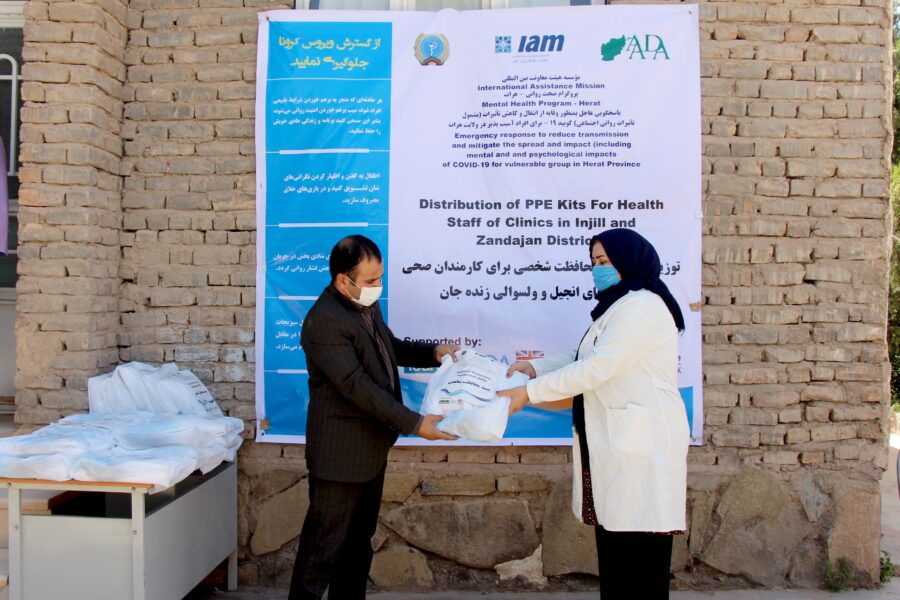Adapt, Survive, Think Differently: Lessons from Afghanistan’s CBMHP during the Covid-19 Crisis
Jul 24, 2020

Change is the only constant- for those of us privileged enough to think of stability as the norm, whether as individuals or as organisations, this has been one of the starkest and most challenging lessons from the COVID-19 pandemic. For the team behind the Community Based Mental Health Project (CBMHP) in Afghanistan, change is nothing new. Resilience to change has long been integrated into their way of working and thinking.
In Afghanistan, uncertainty and instability have been the norm in recent decades as a result of war, terrorist violence, political turbulence and economic strife. An estimated 50% of the population experience mental health conditions. Run by International Assistance Mission(IAM), CBMHP builds accessible mental health systems to meet this massive need, by drawing on a network of community volunteers. The project works to build inclusive, knowledgeable and well-resourced communities as a sustainable solution to the widespread mental health crisis, and is part of IAM’s wider Mental Health Program. These core values have prevailed through times of turbulence and the COVID-19 pandemic was no exception. We spoke with Javid Sadat, Mental Health Program Manager for International Assistance Mission, about their work during this time.
The COVID-19 Crisis
The national crisis began for Afghanistan in March when over huge numbers of migrant workers hurried home from the neighbouring high-risk hotspot, Iran, overwhelming Afghanistan’s already-overstretched hospitals[1]. In a nation where the lockdown threatened job security, and there was a potential risk of 7 million child deaths from starvation, it was evident that CBMHP had to tackle numerous hurdles simultaneously in this complex situation. CBMHP’s response to the crisis was rapid. While many companies and NGOs around the world were freezing their work in the face of change wrought by the pandemic, CBMHP were listening, reflecting and responding. The team coined a new motto that formed the basis of their response: “adapt, survive, think differently”. Here’s how that mindset shaped their response:
1) Supporting the team
With an impending government enforced lockdown, job security for Afghans was a very real and crippling source of anxiety. CBMHP’s first pivotal realisation was that the team could not provide the required mental health support if their own mental health was compromised. Understanding this, management’s first step was to reassure the team of their job security. They put a support system in place, delivering food packages and resilience training to staff. Simple steps like these resulted in a huge change amongst the team. Feelings of inaction and stress were replaced with the excitement and motivation to develop a contingency plan to navigate the new crisis.
2) Getting a seat at the experts table
Early on, IAM, CBMHP’s parent organisation, was invited by the government to join an advisory group to support them in navigating the crisis and provide expertise on the mental health impacts of the pandemic. Together with leading health sector officials, they developed a plan to provide the necessary support to critical populations. In this way, CBMHP were able to impact COVID-19 response at policy level, advocating for mental health to be viewed as a priority during this crisis, and ensure that the necessary care was included in the government’s plan of action.
3) Meeting new needs on the ground
As the pandemic worsened within Afghanistan, it became clear that a major challenge was the tension between frontline healthcare workers and families of COVID-19 patients. Distressed families were outraged by health care workers preventing them from visiting their loved ones. At the same time, healthcare workers were overworked and under-resourced in dealing with these stressful circumstances. This was having negative mental health impacts on both parties.
CBMHP devised a two-pronged approach to tackle this. Alongside distributing PPE resources, CBMHP integrated two strands of their work - peacebuilding and conflict resolution and psychosocial first aid training – to deliver a bespoke training package to healthcare staff that equipped them to provide the right support to the families of COVID-19 patients. This also helped them support their own mental health through this difficult time. Simultaneously, patients who received positive COVID-19 test results were provided with the phone number of a professional counsellor.
4) Adapting methods and approaches
CBMHP also found new ways to reach the general population amidst the logistical challenges presented by lockdown. They have used TV shows to teach widespread audiences about both mental health challenges and COVID-19 risks. Adapting their skills to provide counselling in innovative ways, they have also been providing counselling over mobile phone to continue aiding people with psychosocial disabilities and those suffering from heightened anxiety during this tumultuous time.
They also adjusted existing counselling methods according to the changing needs of vulnerable populations. It became clear that women and children, facing increased domestic pressures with the whole family stuck at home, were facing significantly higher rates of marital conflict and domestic violence. CBMHP responded by adjusting their methods to include husbands in counselling sessions. In this way they were able to mediate conflicts and encourage strategies for coping with the crisis together.
Key Learnings from CBMHP’s Journey
Wherever we are in the world, it’s clear that the COVID-19 crisis is far from over. The situation in Afghanistan remains severe. CBMHP’s case is testament to the power of strong leadership, organisational flexibility and commitment to care in delivering rapid and effective response in the face of crisis.
“Things are not perfect. The situation here is still very serious and there is still a lot of work that needs to be done, and of course many factors are beyond our control. But through all this I try to keep moving forward, keep thinking positive.”
As Javid rightly implies, hope can be found in the darkest of times.
[1] https://www.theguardian.com/world/2020/may/02/afghanistan-in-new-battle-against-ravages-of-covid-19